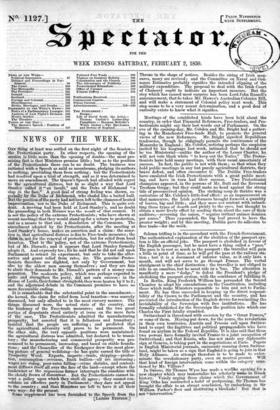NEWS OF THE WEEK.
1)3TE thing at least was settled on the first night of the Session— the Protectionist party. In other respects, the opening of the session is little more than the opening of doubts—the most pro- mising fact is that Ministers promise little ; but as to the position of the Protectionists there can be no doubt. The business was initiated with a Speech as mild as moonbeams, pledging its authors. to nothing, precluding them from nothing; but the Protectionists.
• had resolved nun a trial of strength, and so it was determined to I
move an amen' II eat. The Queen's Speech had alluded with regret to the agricultural distress but in so slight a way that Lord -Stanley called it "an insult," and the Duke of Richmond "a slap in the face." A good deal of strong feeling was shown, es- pecially by the Duke of Richmond, who chafed like a baited bull. But the position of the party had notbeen left to the chaneesof heated improvisation, nor to the Duke of Richmond. This is quite evi- dent. A meeting had been held at Lord Stanley's and no doubt the proceeding in both Houses was the result of that council. It is not the policy of the extreme Protectionists ; who have shown at recent meetings that they would stand up for a return to protection, and as a means to that end, a dissolution of the Commons. The amendment adopted by the Protectionists, after the meeting at Lord Stanley's house, akes an assertion and a claim: the asser- tion is, that agricultural distress is due to Free-trade measures ; the claim, is, not for the renewal of protection, but for relief from local taxation. That is the policy, not of the extreme Protectionists, but of Mr. Disraeli ; and it appears that Lord Stanley formally adopts it. And expressly too ;for he said that he did not call upon Parliament to retract its experiment, but only to take the alter- native and grant relief from rates, &o. The genuine Protec- tionists therefore are slighted, not only by Government, but also by the ablest men among themselves ; and they are fain to abate their demands to Mr. Disraeli's pattern of a money com- pensation. The moderate policy, which was perhaps expected to unite and strengthen the party, did not earn success; in the House of Lords, their former stannghold,they were beaten by 3 to 2; and the adjourned debate in the Commons promises to have no more favourable ending. It is remarkable that the substantial point in the amendment—. the kernel, the claim for relief from local taxation—was scarcely discussed, but only alluded to in the most cursory manner. The things discussed were, the actual state of the country, and the tendency of the Free-trade measures; and the two great parties of disputants stood entirely at issue on the mere facts of the case. The Protectionists admitted the manufacturing prosperity, but asserted that it is fallacious and transitory ; insisted that the people are suffering ; and predicted that the agricultural adversity will prove to be permanent. On the other side the very opposite positions were maintained : the agricultural distress was admitted, but declared to be transi- tory; the manufacturing and commercial prosperity was pro- Bounced to be permanent, increasing, and based on stable founda- tions; and the Chancellor of the Exchequer drew the most glow- ing picture of general welldoing—he has quite earned the title of Prosperity Wood. Exports, imports—trade, shipping—produc- tion, consumption—revenue, Bank bullion—all are increasing; wages are rising, poor-rates falling—crime shrinks, and content- ment diffuses itself all over the face of the land—except where the landowner or the sequacious farmer interrupts the sunshine with the cloudy frown of discontent. But the Protectionists cannot in- vent a policy upon which they shall all agree ; they cannot con- solidate an effective party in Parliament; they dare not appeal to the country ; and thus Ministers are left to have it all their own way—for the present. Throne in the shape of notices. Besides the string of Irish mea- sures, many are revived; and the Committee on Naval and Ord- nance Estimates probably signifies the intended clipping of the military expenditure. The proposal to deal with the Irish Court of Chancery ought to indicate an important measure. But the step which has caused most surprise has been Lord John Russell's announcement, that he takes Mr. Hawes's Australian Colonies Bill, and will make a statement of Colonial policy next week. This step seems to be a very recent determination, and a good deal of curiosity exists to know what it signifies.


























